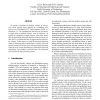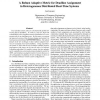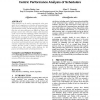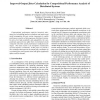967 search results - page 69 / 194 » Multi-users scheduling in parallel systems |
IPPS
2003
IEEE
14 years 1 months ago
2003
IEEE
In systems consisting of multiple clusters of processors which employ space sharing for scheduling jobs, such as our Distributed ASCI1 Supercomputer (DAS), coallocation, i.e., the...
IPPS
1999
IEEE
14 years 3 days ago
1999
IEEE
In a real-time system, tasks are constrained by global endto-end (E-T-E) deadlines. In order to cater for high task schedulability, these deadlines must be distributed over compon...
HPDC
2007
IEEE
14 years 2 months ago
2007
IEEE
Utility functions can be used to represent the value users attach to job completion as a function of turnaround time. Most previous scheduling research used simple synthetic repre...
IPPS
2007
IEEE
14 years 2 months ago
2007
IEEE
Compositional performance analysis iteratively alternates local scheduling analysis techniques and output event model propagation between system components to enable performance a...
SBACPAD
2007
IEEE
14 years 2 months ago
2007
IEEE
One way to exploit Thread Level Parallelism (TLP) is to use architectures that implement novel multithreaded execution models, like Scheduled DataFlow (SDF). This latter model pro...




